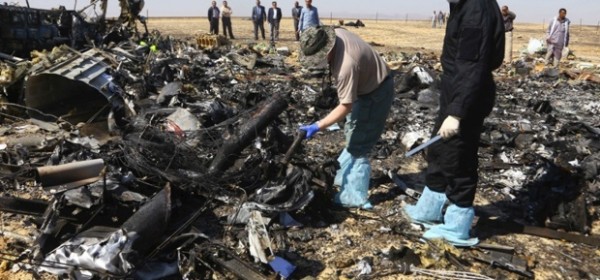The Irish Aviation Authority has instructed Irish airlines to cancel flights over the Sinai peninsula in Egypt after it emerged that a Russian passenger jet which crashed may have been brought down by an explosive device.
A total of 224 people died when the Airbus A321-200 came down 23 minutes after leaving the resort of Sharm el-Sheikh on Saturday.
Neither Aer Lingus nor Ryanair operate flights to Egypt from Ireland, but they have been told to avoid using airspace near where the crash happened.
“The Irish Aviation Authority directs Irish airline operators not to operate to/from Sharm el-Sheikh airport, Egypt or in the Egyptian Sinai Peninsula airspace until further notice,” the IAA said in a statement last night. “An update will issue once further information becomes available.”
Thousands of British travellers were stranded in Egypt last night after the UK prime minister’s office declared that a bomb was likely to have caused the Russian aircraft to explode in mid-air.
Major British airlines grounded all flights in and out of the resort after No 10’s warning, which was believed to have followed information from foreign intelligence agencies, including the US. As many as 20,000 British tourists are understood to be in the area.
Downing Street’s declaration that an explosive device “may well” have brought down the aircraft caused a diplomatic row on the eve of a visit to Britain by President Sisi of Egypt. Sameh Shoukry, the country’s foreign minister, described it as “premature and unwarranted”.
The Metrojet flight was bound for St Petersburg from the Red Sea resort when it crashed over the Sinai desert after breaking apart. The 224 people on board, almost all Russian tourists, were killed.
The aircraft climbed to 31,000ft as normal in the first 21 minutes of the flight before dramatically descending 5,000ft and disappearing from radar screens. Local Bedouin tribesmen told reporters that they had seen smoke and flames from the jet before it hit the ground.
A specialist team of British security experts was sent to assess the security of Sharm el-Sheikh’s airport and a team of Irish aviation officials also travelled to Egypt on Monday to help with the investigation. The A321 aircraft, operated by a Russian airline under the brand name Metrojet, was registered in Ireland through a leasing company.
David Cameron held a Cobra security meeting last night. Philip Hammond, the British foreign secretary, said afterwards that there was “a significant possibility the crash was caused by an explosive device on board the plane”. He apologised to those caught up in the flight ban, saying: “We have to put safety and security of British nationals above all other.” He also said that the government was advising against all but essential travel to Sharm el-Sheikh.
Responding to Mr Shoukry, Mr Hammond said: “He hasn’t seen the information we have.”
Islamic State or one of its affiliate groups was likely to have been behind a bomb planted on board, according to US intelligence sources. “There is a definite feeling it was an explosive device planted in luggage or somewhere on the plane,” an official told CNN.
The Egyptian government has been fighting jihadist groups in northern Sinai, close to where the aircraft came down. Isis had claimed responsibility for the attack, but the suggestion was dismissed by the Russian and Egyptian authorities, which suspected a technical fault. The terrorist group challenged sceptics to prove that it was not behind the crash. “We will detail how it came down at the time of our choosing,” Isis said in a statement posted on social media sites.
The intelligence behind Downing Street’s decision did not come exclusively from examinations of the debris. There were suggestions from within the British government and intelligence sources that foreign agencies had contributed to the decision. A government source said that it had not been driven by “a specific piece” of intelligence.
Russian inspectors would “check all theories, including a terrorist attack and a technical fault”, insiders said yesterday. The cockpit voice recorder from the jet was badly damaged, Russia’s Interstate Air Commission said.
Fawaz Gerges, professor of international relations at the London School of Economics, said terrorists from an Isis affiliate based in northern Sinai could have infiltrated the airport. “Very easily I could imagine a cell — luggage industry, catering industry, refuelling — infiltrating the airport,” he told Sky News. “This would be a likely scenario.” He added: “There are 20,000 British tourists now in Sharm el-Sheikh . . . this could really be devastating for Egypt.”
Several British airlines grounded flights to and from the resort. Thomson Airways grounded six flights and Monarch said that three would be cancelled. EasyJet said that Sharm el-Sheikh flights were “under review”, putting a question mark over six departures today. British Airways, which has one flight out of the resort today, said it was “liaising closely with the government”. Two Thomson flights are scheduled to leave the resort today.
The British government banned three flights from leaving the resort last night. One Thomson flight to Manchester was grounded alongside two easyJet departures to Luton and Gatwick.




